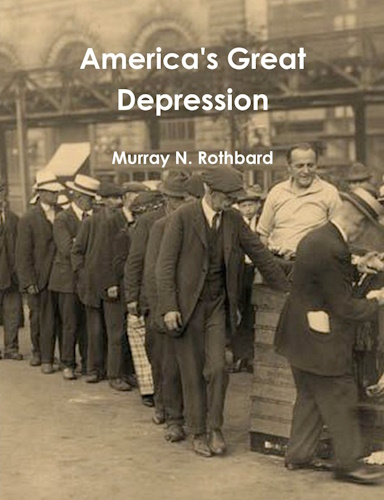

America's Great Depression is the classic treatise on the 1930s Great Depression and its root causes. Author Rothbard blames government interventionist policies for magnifying the duration, breadth, and intensity of the Great Depression. He explains how government manipulation of the money supply sets the stage for the familiar "boom-bust" phases of the modern market which we know all too well. He then details the inflationary policies of the Federal Reserve from 1921 to 1929 as evidence that the depression was essentially caused not by speculation, but by government and central bank interference in the market. Clearly we find history tragically repeating itself today. A must-read.
Paperback: 194 pages
Publisher: CreateSpace Independent Publishing Platform (November 14, 2011)
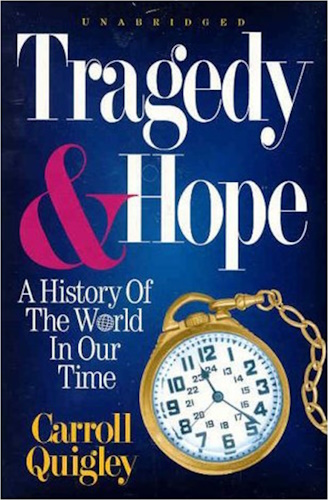

Tragedy & Hope: A History of the World in Our Time

Uncensored. Tragedy & Hope: A History of the World in Our Time: Carroll Quigley GSG & Associates Publishers Unabridged Release! This powerful literature is the ultimate insider admission of a secret global elite that has impacted nearly every modern historical event. Learn how the Anglo-American banking elite were able to secretly establish and maintain their global power. This massive hardcover book of 1348 pages provides a detailed world history beginning with the industrial revolution and imperialism through two world wars, a global depression and the rise of communism. Tragedy & Hope is the definitive work on the world's power structure and an essential source material for understanding the history, goals and actions of the New World Order. The only authorized version after 1st print.
Hardcover: 1348 pages
Publisher: GSG and Associates (2004)
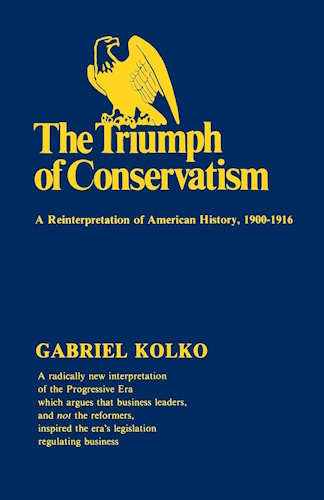

From the birth of Democracy in Athens, the true battle has been between the philosophy of Draco and the philosophy of Solon, philosophies of constancy and progression, respectively. In our time we call them Conservative and Liberal, and each sees the other as evil and a danger to Democracy. This book is a reinterpretation of the so-called "Progressive Era" under the presidencies of Teddy Roosevelt and Woodrow Wilson, with the relatively draconian presidency of William Taft in between.
Paperback: 356 pages
Publisher: Free Press; unknown edition (March 1, 1977)
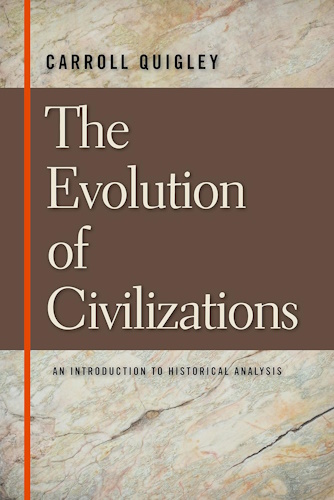

The Evolution of Civilizations

Carroll Quigley was a legendary teacher at the Georgetown School of Foreign Service. His course on the history of civilization was extraordinary in its scope and in its impact on his students.
Like the course, The Evolution of Civilizations is a comprehensive and perceptive look at the factors behind the rise and fall of civilizations.
Quigley defines a civilization as "a producing society with an instrument of expansion." A civilization's decline is not inevitable but occurs when its instrument of expansion is transformed into an institution—that is, when social arrangements that meet real social needs are transformed into social institutions serving their own purposes regardless of real social needs.
Paperback: 444 pages
Publisher: Liberty Fund Inc.; 2nd edition (August 1, 1979)
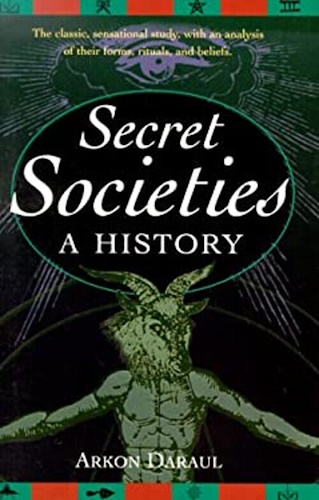

Customer Review:
I've owned Daraul's book for years. The point of this book I believe is twofold.
First it serves as an excellent introduction to the history and concept of secret societies. This might put off the mavens of the current reign of conspiracy theorists. But it is quite successful and interesting as an introduction. In other words it is an excellent starting point, especially for some of the most obscure cults like the skoptsys of Russia.
Secondly I believe that there is an underlying structure to the book in finding connections between so many of these secret groups. Clearly there is a gnostic underground represented among them.
Now if someone is looking for the kind of global conspiracy represented by folks like Icke, Marrs and Jones this is not the book for you. It takes a more objective approach. It is neither an apologia for these cults nor a demonization of same. In short it is simply a good informative book to begin to research a truly arcane area of thought. For those deeply immersed in the notion of secret societies and Illuminati conspiracies this book won't really be what you are looking for.
Paperback: 223 pages
Publisher: TANDEM BOOKS LIMITED; paperback / softback edition (1965)
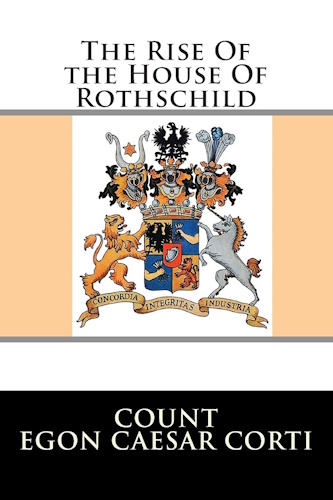

The Rise Of the House Of Rothschild

The object of this volume, which deals with the period 1770-1830, is to trace the rise of The House of Rothschild from its small beginnings to the great position it attained, culminating in the year of its great crisis.
The House of Rothschild, as will be readily understood, did not throw open its archives to the author's inspection, for it is particularly careful in guarding its more important business secrets. But this was not entirely without its advantage, for it left the Count Corti completely free from political considerations and uninfluenced by racial, national, and religious predilections or antipathies. The Count was enabled to begin an independent historical research into the part played by this House in the nineteenth century, which was known to be far more important than was commonly thought.
The general scheme of this work was built upon facts alone, in a practical way such as will help us to form our own judgment on individuals and the part they played in world events.
Paperback: 440 pages
Publisher: CreateSpace Independent Publishing Platform (February 7, 2013)
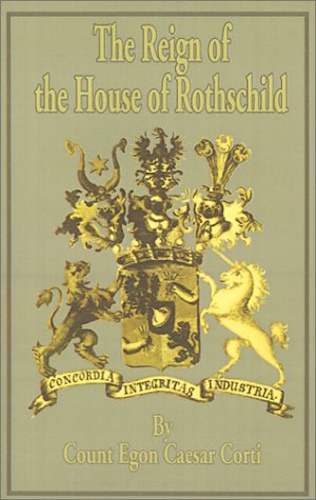

The Reign of the House of Rothschild

This volume carries on the history of the House of Rothschild as revealed by the relevant documents from 1830 up to the peace that concluded the Franco-Prussian War in 1871. In the writing of this volume, the Rothschild families have brought no influence of any kind to bear; the author's aim has been to portray without prejudice or partiality the tremendous part that the House played in the events of the nineteenth century. Original documents and letters that had been intercepted have occasionally afforded particularly illuminating revelations; although, in the case of extracts from some of the letters, it is necessary to bear in mind that the originals were probably carefully altered by the Rothschilds themselves, with the deliberate intention of making upon persons like Metternich a definite impression such as would assist them in carrying out their plans. Seen in this light they are no less instructive and characteristic of the methods of the House than the more ingenuous documents that undoubtedly constitute a large proportion of those used in this work.
The epilogue which appears at the end of the book makes no claim to continue the treatment of the subject on the same lines; it merely attempts to bring out one or two of the more striking moves executed by the House of Rothschild on the political chessboard during the sixty years leading up to the present day, moves which show how the House, in spite of growing difficulties, vanishing influence, and the powerful competition of younger and richer firms, has endeavored until the most recent times to maintain its position, to influence international policies, and although with diminishing success, to drive them along the path which corresponded to the interests of the bank.
Hardcover: 457 pages
Publisher: Cosmopolitan book corporation; First Edition edition (1928)
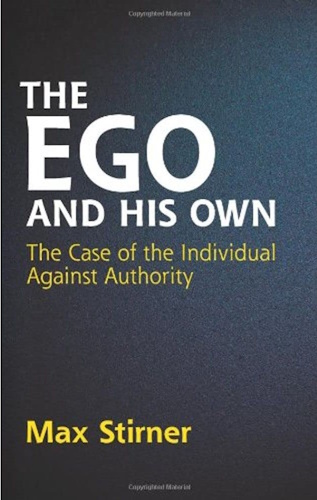

The Ego and His Own: The Case of the Individual Against Authority (Dover Books on Western Philosophy)

Credited with influencing the philosophies of Nietzsche and Ayn Rand and the development of libertarianism and existentialism, this prophetic 1844 work challenges the very notion of a common good as the driving force of civilization. By examining the role of the human ego, author Max Stirner chronicles the battle of the individual against the collective — showing how, throughout history, the latter invariably leads to oppression. Stirner begins with a study of the individual ego and then traces its subjugation from ancient times to the nineteenth century. Nothing escapes his indictment: the ancient philosophers, Christianity, monarchism, the bourgeois state; all have fettered individuals with laws, morality, and obligations. Revolutions expunge one evil only to replace it with another, and Stirner predicted — years before the publication of Marx's Manifesto — that socialism would climax in the ultimate totalitarian state.
For students of political science and philosophy, this book is essential reading. For those concerned about the encroachment of authority upon individual liberty, Stirner articulates a philosophy that remains unsurpassed in its scope.
Paperback: 400 pages
Publisher: Dover Publications (December 16, 2005)
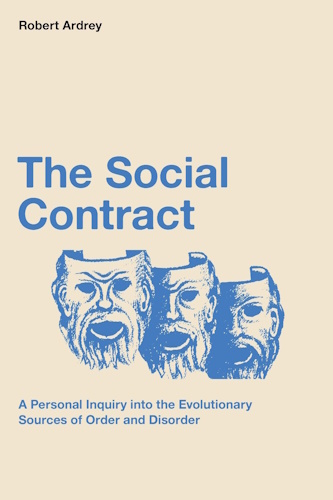

The Social Contract: A Personal Inquiry into the Evolutionary Sources of Order and Disorder (Robert Ardrey's Nature of Man Series) (Volume 3)

“Violation of biological command has been the failure of social man. Vertebrates though we may be, we have ignored the law of equal opportunity since civilization’s earliest hours. Sexually reproducing beings though we are, we pretend today that the law of inequality does not exist. And enlightened though we may be, while we pursue the unattainable we make impossible the realizable.” In his two previous books, Robert Ardrey exploded a series of philosophical landmines. African Genesis (1961) introduced his new evolutionary approach to an understanding of men. Then came The Territorial Imperative (1966), whose title is now a common phrase in our language. The Social Contract is the third in the series, and it denies that men are created equal - but that they deserve absolute equality of opportunity. Robert Ardrey maintains that since the publication of Rousseau’s Social Contract two centuries ago, men have wasted social resources, converted much of education into a process of brain-washing, committed themselves to one political insane asylum after another, all in pursuit of a goal that is a natural impossibility in any sexually reproducing species. Discarding the myth, Robert Ardrey combines his wealth of knowledge of animal ways with the new insights of modern biology and the newest revelations concerning human evolution to probe perplexing contemporary problems: the revolt of the young, the status struggle and the role of leadership, population control, urban overcrowding, violence in civilized life. Praise for the 1970 edition: “Robert Ardrey’s The Social Contract is as imaginative and exciting as his African Genesis or The Territorial Imperative, but this new book is broader in scope, better balanced, and more philosophical than its predecessors. I disagree with some of Ardrey’s opinions concerning human aggression, because I have greater faith than he has in the power of environmental conditioning. But this does not affect my conviction that The Social Contract will be of immense value in helping the public to probe into the dark and misty areas where zoology, anthropology, and prehistory join to account for the origins of man as a social animal.” - Rene Dubos, Rockefeller University
Paperback: 322 pages
Publisher: StoryDesign LTD (September 9, 2014)
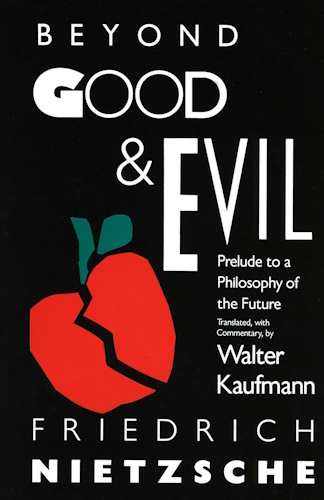

Beyond Good & Evil: Prelude to a Philosophy of the Future

Represents Nietzsche's attempt to sum up his philosophy. In nine parts the book is designed to give the reader a comprehensive idea of Nietzsche's thought and style: they span "The Prejudices of Philsophers," "The Free Spirit," religion, morals, scholarship, "Our Virtues," "Peoples and Fatherlands," and "What Is Noble," as well as epigrams and a concluding poem. Beyond Good and Evil is one of the most remarkable and influential books of the nineteenth century.
This translation by Walter Kaufmann has become the standard one, for accuracy and fidelity to the eccentricities and grace of the style of the original. The translation is based on the only edition Nietzsche himself published, and all variant reading in later editions. This volume offers an inclusive index of subjects and persons, as well as a running footnote commentary on the text.
From the Inside Flap
Represents Nietzsche's attempt to sum up his philosophy. In nine parts the book is designed to give the reader a comprehensive idea of Nietzche's thought and style. With an inclusive index of subjects and persons.
Paperback: 288 pages
Publisher: Vintage (December 17, 1989)

Manor Farm is like any other English farm, expect for a drunken owner, Mr Jones, incompetent workers and oppressed animals. Fed up with the ignorance of their human masters, the animals rise up in rebellion and take over the farm. Led by intellectually superior pigs like Snowball and Napoleon, the animals how to take charge of their destiny and remove the inequities of their lives. But as time passes, the realize that things aren't happening quite as expected. Animal Farm is, one level, a simple story about barnyard animals. On a much deeper level, it is a savage political satire on corrupted ideals, misdirected revolutions and class conflict-themes as valid today as they were sixty years ago.
About the Author
Eric Arthur Blair (George Orwell) was an English writer. His work is characterized by lucid prose, biting social criticism, opposition to totalitarianism, and outspoken support of democratic socialism. He is best-known for his dystopian social-commentary novel 1984 and his allegorical fairytale Animal Farm.
Hardcover: 144 pages
Publisher: Houghton Mifflin Harcourt (November 20, 1990)


The Prince is a 16th-century political treatise by the Italian diplomat and political theorist Niccolò Machiavelli. From correspondence a version appears to have been distributed in 1513, using a Latin title, De Principatibus (About Principalities). However, the printed version was not published until 1532, five years after Machiavelli's death. This was done with the permission of the Medici pope Clement VII, but "long before then, in fact since the first appearance of the Prince in manuscript, controversy had swirled about his writings". Although it was written as if it were a traditional work in the mirrors for princes style, it is generally agreed that it was especially innovative. This is only partly because it was written in the vernacular Italian rather than Latin, a practice which had become increasingly popular since the publication of Dante's Divine Comedy and other works of Renaissance literature. The Prince is sometimes claimed to be one of the first works of modern philosophy, especially modern political philosophy, in which the effective truth is taken to be more important than any abstract ideal. It was also in direct conflict with the dominant Catholic and scholastic doctrines of the time concerning how to consider politics and ethics. Although it is relatively short, the treatise is the most remembered of Machiavelli's works and the one most responsible for bringing the word "Machiavellian" into usage as a pejorative. It also helped make "Old Nick" an English term for the devil, and even contributed to the modern negative connotations of the words "politics" and "politician" in western countries. In terms of subject matter it overlaps with the much longer Discourses on Livy, which was written a few years later. In its use of near-contemporary Italians as examples of people who perpetrated criminal deeds for politics, another lesser-known work by Machiavelli which The Prince has been compared to is the Life of Castruccio Castracani. The descriptions within The Prince have the general theme of accepting that the aims of princes—such as glory and survival—can justify the use of immoral means to achieve those ends. “ He who neglects what is done for what ought to be done, sooner effects his ruin than his preservation. ” —Machiavelli, "Chapter 15"
About the Author
Niccolò di Bernardo dei Machiavelli (3 May 1469 21 June 1527) was an Italian historian, politician, diplomat, philosopher, humanist and writer based in Florence during the Renaissance. He was for many years an official in the Florentine Republic, with responsibilities in diplomatic and military affairs. He was a founder of modern political science, and more specifically political ethics. He also wrote comedies, carnival songs, and poetry. His personal correspondence is renowned in the Italian language. He was Secretary to the Second Chancery of the Republic of Florence from 1498 to 1512, when the Medici were out of power. He wrote his masterpiece, The Prince, after the Medici had recovered power and he no longer held a position of responsibility in Florence.
Paperback: 82 pages
Publisher: CreateSpace Independent Publishing Platform (November 22, 2017)
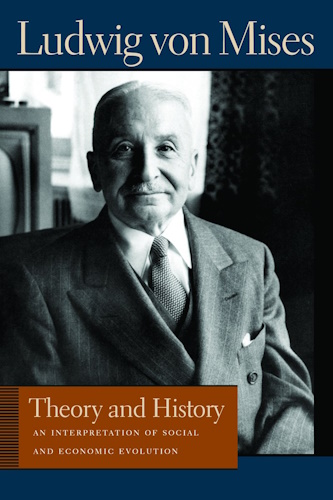

Theory and History: An Interpretation of Social and Economic Evaluation (Lib Works Ludwig Von Mises CL)

Ludwig von Mises was the leading exponent of the Austrian School of economics throughout most of the twentieth century. He has long been regarded as a most knowledgeable and respected economist, even though his teachings were generally outside the mainstream.
Theory and History is primarily a critique of Karl Marx, his materialism, and his prediction of the inevitability of socialism. Marx attributes the creation of tools and machines, as well as the economic structure of society, to undefined material productive forces; Mises rejects this materialistic view; he points out that tools and machines are actually created by individuals acting on the basis of non-materialistic ideas.
This book discusses the theory of economics, i.e., the study of purposive human action, and with history, the record of the past actions of individuals. All actions are determined by ideas. Thoughts and ideas are real things, Mises writes. Although intangible and immaterial, they are factors in bringing about changes in the realm, of tangible and material things. Rather than rejecting the study of historical change as a useless pastime, Mises considers it of the utmost practical importance. History looks backward into the past, but the lesson it teaches concerns things to come. History opens the mind to an understanding of human nature, increases wisdom, and distinguishes civilized man from the barbarian. Moreover, historical knowledge is of the utmost importance in helping to anticipate and plan for the future.
Though Theory and History may not be studied as often as other, more popular Mises works, it provides great insight into Mises s fundamental thoughts and is a fascinating exploration of human action.
Ludwig von Mises (18811973) was the leading spokesman of the Austrian School of Economics throughout most of the twentieth century. He earned his doctorate in law and economics from the University of Vienna in 1906. In 1926, Mises founded the Austrian Institute for Business Cycle Research. From 1909 to 1934, he was an economist for the Vienna Chamber of Commerce. Before the Anschluss, in 1934 Mises left for Geneva, where he was a professor at the Graduate Institute of International Studies until 1940, when he emigrated to New York City. From 1948 to 1969, he was a visiting professor at New York University.
Bettina Bien Greaves is a former resident scholar, trustee, and longtime staff member of the Foundation for Economic Education. She has written and lectured extensively on topics of free market economics. Her articles have appeared in such journals as Human Events, Reason, and The Freeman: Ideas on Liberty. A student of Mises, Greaves has become an expert on his work in particular and that of the Austrian School of economics in general. She has translated several Mises monographs, compiled an annotated bibliography of his work, and edited collections of papers by Mises and other members of the Austrian School.
About the Author
Ludwig von Mises (1881-1973) earned his doctorate in law and economics from the University of Vienna in 1906. In 1926, Mises founded the Austrian Institute for Business Cycle Research. From 1909 to 1934, he was an economist for the Vienna Chamber of Commerce. Before the Anschluss, in 1934 Mises left for Geneva, where he was a professor at the Graduate Institute of International Studies until 1940, when he emigrated to New York City. From 1948 to 1969, he was a visiting professor at New York University.
Paperback: 281 pages
Publisher: Liberty Fund, Inc. (August 9, 2005)
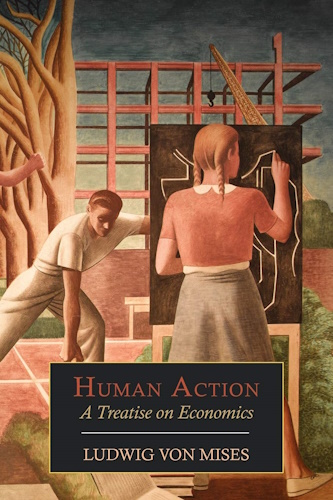

Human Action: A Treatise on Economics

In the foreword to Human Action: A Treatise on Economics, Mises explains complex market phenomena as "the outcomes of countless conscious, purposive actions, choices, and preferences of individuals, each of whom was trying as best as he or she could under the circumstances to attain various wants and ends and to avoid undesired consequences." It is individual choices in response to personal subjective value judgments that ultimately determine market phenomena—supply and demand, prices, the pattern of production, and even profits and losses. Although governments may presume to set "prices," it is individuals who, by their actions and choices through competitive bidding for money, products, and services, actually determine "prices". Thus, Mises presents economics—not as a study of material goods, services, and products—but as a study of human actions. He sees the science of human action, praxeology, as a science of reason and logic, which recognizes a regularity in the sequence and interrelationships among market phenomena. Mises defends the methodology of praxeology against the criticisms of Marxists, socialists, positivists, and mathematical statisticians.
Mises attributes the tremendous technological progress and the consequent increase in wealth and general welfare in the last two centuries to the introduction of liberal government policies based on free-market economic teachings, creating an economic and political environment which permits individuals to pursue their respective goals in freedom and peace. Mises also explains the futility and counter-productiveness of government attempts to regulate, control, and equalize all people's circumstances: "Men are born unequal and ... it is precisely their inequality that generates social cooperation and civilization."
Ludwig von Mises (1881–1973) was the leading spokesman of the Austrian School of Economics throughout most of the twentieth century. He earned his doctorate in law and economics from the University of Vienna in 1906. In 1926, Mises founded the Austrian Institute for Business Cycle Research. From 1909 to 1934, he was an economist for the Vienna Chamber of Commerce. Before the Anschluss, in 1934 Mises left for Geneva, where he was a professor at the Graduate Institute of International Studies until 1940, when he emigrated to New York City. From 1948 to 1969, he was a visiting professor at New York University.
Bettina Bien Greaves is a former resident scholar, trustee, and longtime staff member of the Foundation for Economic Education. She has written and lectured extensively on topics of free market economics. Her articles have appeared in such journals as Human Events, Reason, and The Freeman: Ideas on Liberty. A student of Mises, Greaves has become an expert on his work in particular and that of the Austrian School of economics in general. She has translated several Mises monographs, compiled an annotated bibliography of his work, and edited collections of papers by Mises and other members of the Austrian School.
Paperback: 908 pages
Publisher: Martino Fine Books (October 10, 2012)
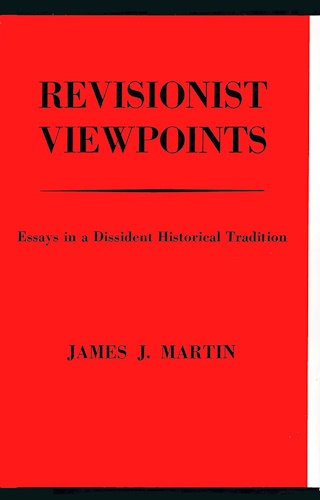

Revisionist Viewpoints: Essays in a Dissident Historical Tradition

An outstanding American historian is at his brilliant, provocative best in these essays on World War II war crimes, Allied terror bombing, Fascism, the draft, the American mass media's wartime love affair with Stalin, America's postwar "defense" imperialism, and more. Important for anyone with a serious interest in twentieth century history.
Paperback: 248 pages
Publisher: Ralph Myles; 1st edition (1971)
![]()
![]()